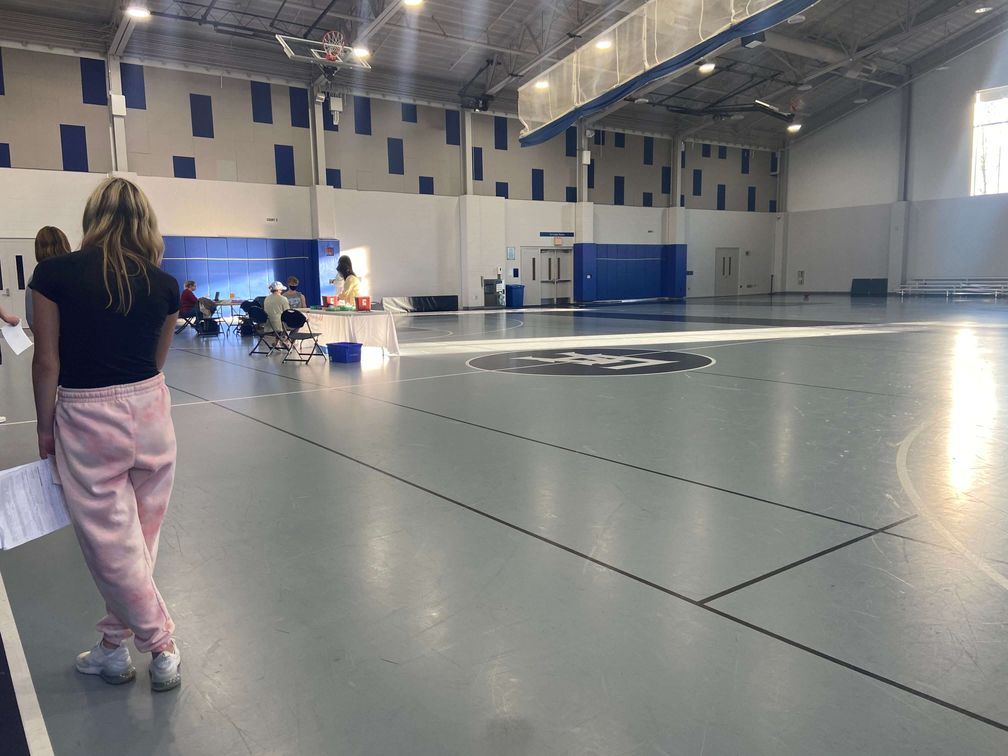Aaron Tang ‘24
COVID-19 vaccines are currently available for EA seniors and juniors and will soon be available to students ages 12 and up on campus. As of now, EA is not planning to require vaccines for the 2021-2022 school year.
As of May 2nd, 58% of the seniors are entirely vaccinated or currently in the vaccination process, according to the EA Health Services department. EA hosted a Springfield Pharmacy vaccine clinic in the Field House on Monday, April 26th, which offered the first dose of the Pfizer vaccine to 80 students. The pharmacy will be offering the second dose of the vaccine on May 17th.

Photo courtesy of Gianna Trala ‘23
Kevin Landaiche ‘23, who received the first dose of the vaccine at EA, comments, “Personally, the whole experience was quick and convenient, and I’m glad EA is giving students the opportunity to get vaccinated. It shows their commitment to getting us back on track and ready to return next year.”
In late March, Pfizer announced that it would ask the FDA to expand its emergency use authorization to allow younger people to receive the vaccine, citing clinical trials that showed 100% efficacy and robust antibody responses in adolescents ranging from 12 to 15 years old. There is a high likelihood that many middle schoolers and all high schoolers will be able to receive the vaccine before the upcoming school year.
Micheal Letts, Head of the Upper School, says, “There have been no discussions for requiring vaccinations for students next year.” However, he hopes that the majority of students will get vaccinated, noting, “If your family doesn’t have any personal reservations, please get the vaccine.” Nicky Criville ‘24 shares, “EA requiring vaccines will be beneficial to decrease the spread of COVID, but [I] also feel that we should recognize personal beliefs and special cases.”
The decision to not require vaccinations for students may come with consequences. Letts says, “It all depends on what percentage of people are vaccinated next year. If we have close to 100% of students vaccinated, I can see how we’re not really wearing masks.” Elizabeth Boruff ‘23 is optimistic: “I really hope that we can go mask-less next year and if that means the majority of kids have the vaccine, then I hope most people try to get it. From what I‘ve heard, most students are trying to get it, whether that’s through EA or not, which gives me a lot of hope for next year.”
If EA does not require masks next year, Letts says he would not be surprised if testing on a fairly regular basis was required for non-vaccinated kids. The two main types of rapid testing available to EA are molecular tests, which detect the presence of a viral genetic using a technique called RT-PCR, and antigen tests, which look for specific proteins on the surface of the virus. These testing methods typically give reliable results within 30 minutes at most.
Will Antczak ‘22 approves of this potential testing plan and says, “Obviously, the vaccine is a solution, but immunity only lasts for a certain duration of time, around 6 months, and so testing in the future seems like a good idea.”
The amount of COVID precautions that EA will take next year will be based on the actions of the students. If the percentage of vaccinated students is high, many aspects of life on campus will return to normal. This includes regular class sizes, normal lunches, athletics, lounges, and more. Boruff expresses her hopes for normalcy, saying, “This year was definitely difficult given all the changes that were made, so I really hope EA does everything they can to get things back to normal for next school year.”